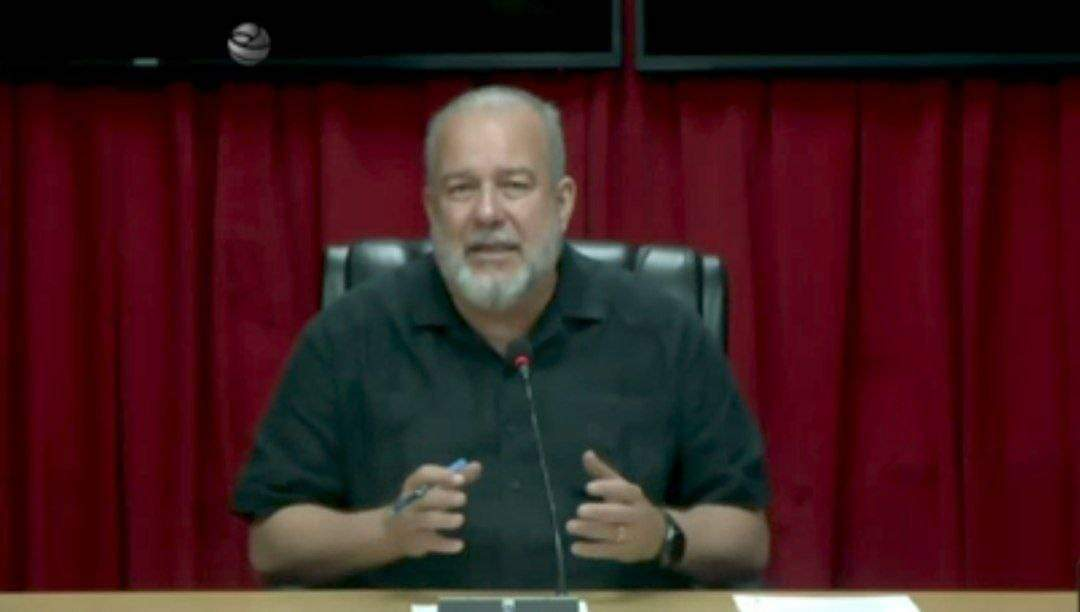
Photo: @PartidoPCC
Havana, October 18 (RHC)-- Cuba is going through a very difficult electro-energy situation in recent days, according to the general director of the National Electric Union (UNE), Alfredo López Valdés, during the special television broadcast this Thursday, conducted by the member of the Political Bureau and Prime Minister, Manuel Marrero Cruz, in which the details associated with the problem and the prospects for a solution were explained to the people, based on daily efforts and the decisions adopted.
Fuel limitations are the main cause of this complex panorama, responsible for the deficit of more than 800 megawatts (MW), which represents around half of the effects produced, during the last day, during peak hours. Mobile and distributed generation are the most affected, above 600 MW.
López Valdés detailed the technical status of the thermal power plants (CTE). There are breakdowns at the Antonio Maceo plant in Santiago de Cuba, with prospects of reinstatement today; and maintenance is being carried out at a unit of the CTE Carlos Manuel de Céspedes in Cienfuegos, and a machine in Santa Cruz del Norte, the process of which will take about six months.
In addition, Energás reported the breakdown of a unit in Varadero, scheduled to return on the 23rd, with 45 MW. There will soon be a need to carry out light maintenance at the Antonio Guiteras plant in Matanzas and at the Lidio Ramón Pérez plant in Felton. Despite the difficulties, thermal generation has behaved as expected.
A COMPREHENSIVE PLAN IS UNDERWAY
The UNE General Director pointed out the priority of increasing the use of national fuels in this generation source and dedicating at least four years to in-depth work in various CTE, including a block in Felton that would provide 250 MW.
On the other hand, he contrasted, less than a year would be enough to get the distributed generation system back up and running. Other actions should be aimed at repairing the transmission lines and measuring electricity.
All of this is part of a comprehensive plan, with a tendency towards gradual improvement, focused on two fundamental aspects: recovering generation capacities and working on the demand side, he explained.
This last indicator increased by 120 MW compared to last year, in the early hours, due to the existence of more electronic equipment, and has exceeded 3,000 MW in total, a figure that was unthinkable before, he stressed. He insisted, along with savings, on the efficient use of energy and reported the purchase of pipes and other resources to manufacture in Cuba several basic components that were initially going to be imported.
Regarding the distribution of fuel oil, Edrey Rocha González, general director of the Cuba-Petroleum Union, said that the ship scheduled to dock in Matanzas on the 9th did not do so until the 14th, due to bad weather, which meant delays in the continuity of the fuel to other ports.
He stated that last night the ship would be arriving at Moa, in Holguín, and would make it possible to incorporate the engines from that area. Likewise, the ships bound for Havana and Mariel were loaded, which will set sail when the weather conditions in the west allow it.
Regarding diesel, he stated that some 2,000 tons will be delivered so that most of the engines can work, and to have a greater impact on generation with this type of units.
Rocha González pointed out that the trend with fuel oil and diesel is towards an increase in their distribution, thanks to availability, so the service can be improved in the coming days.
Regarding the distribution of liquefied petroleum gas (LPG), he assured that today the distribution will begin throughout the national territory, which will be reflected in the decrease in demand, since in the previous days the burden of cooking food was assumed by electricity generation due to the lack of LPG.
For his part, the Prime Minister specified additional indications focused on savings, among which are the suspension of non-essential work activities, the incentive for teleworking, the operation of the Energy Councils, the general disconnection of empty premises and the shutdown, during peak hours, of high-consumption equipment such as refrigerators, ovens and freezers.
He also discussed the implementation of the national program, which includes maximizing investments in national crude oil and the participation of renewable sources, with respect to which López Valdés highlighted the work on 31 photovoltaic parks of 21 MW.
He also emphasized the need to involve the non-state sector in the collective effort to save, even with the collection of non-subsidized rates according to their profit levels.

